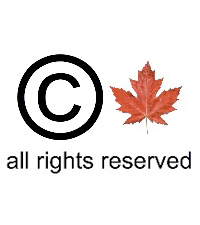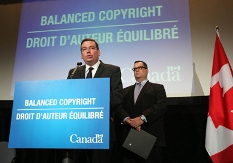When is a song not a song?
When is your DVD not your DVD?
The country’s copyright laws were last updated in 1997 – a digital eternity ago when mobile broadcasting, online teaching and YouTube mash-ups were someone’s pipedream – or nightmare.
 Four times over the 15 years since then, Canadian law-makers tried to implement updates and amendments to the Copyright Act, but national elections, parliamentary prorogues and other events conspired to delay them
Four times over the 15 years since then, Canadian law-makers tried to implement updates and amendments to the Copyright Act, but national elections, parliamentary prorogues and other events conspired to delay them
And now, the holidays will delay proceedings again.
The government had tabled its new copyright legislation, but it has also, effective Thursday, December 15, adjourned Parliamentary proceedings until at least January 30, 2012.
Copyright is obviously of great interest to techno-savvy consumers. The government committee that was reviewing the Act heard from consumers, musicians, filmmakers, librarians, teachers, software developers and hardware manufacturers alike during its fact finding process.
Industry Minister Christian Paradis and Heritage Minister James Moore have introduced the results of those findings, in the Copyright Modernization Act.
The law will now recognize a hefty monetary difference, should a violation of new copyright laws, between a commercial violation of copyright law and an individual violation.
Individuals could be liable for penalties between $100 and $5,000, well below the current $20,000 maximum.
“Canadians will not be penalized for transferring their favourite novel or album onto their mobile device,” Minister Paradis re-assured.

The Copyright Modernization Act
“They now will be able to upload the content they have created, like mash-ups, to [I]nternet sites without facing punishment.”
Ironically, there’s a flurry of related activity at the Supreme Court – no fewer than five copyright related cases are now – or will soon be – reviewed at the highest judicial level.
The court is looking at when a song is not a song, but rather a piece of consumer research. Music previews on some sites, like iTunes, should not be subject to copyright and payment for its use should not be made, say some arguments. Nonsense, say the opponents. A song is a song and it is protected by copyright in any form.
These cases – and their outcome – are no small matter. Try some $45 million dollars; that’s the annual amount music copyright holders say they are entitled to collect from television providers for the “performance” of music in movie and TV show soundtracks. And that’s just one of the cases.
The court will also hear about digital rights management issues, and whether the removal or by-passing of a digital lock – say, on a DVD purchased in Europe so it can be watched in Canada – is actually legal or not.
Other matters the Supreme Court will decide upon include digital rights management issues, and whether the removal or by-passing of a digital lock – say, on a DVD purchased in Europe so it can be watched in Canada – is actually legal or not. A final decision from the Court could take months.
If and when the new copyright legislation is passed, you will be able to:
- Record TV, radio and Internet broadcasts to use later.
- Copy purchased songs and other content to devices you own, like iPods.
- Create backup copies of songs and other content you own.
- Use copyrighted materials to create a parody or satire (under fair dealing).
- Use copyrighted materials you have acquired legally to create YouTube videos for non-commercial purposes.
However, if it means breaking a ‘digital lock’, none of these rights are available and prosecution is possible.
Many critics of the Act note that this provision in the reintroduced bill makes it illegal to break or circumvent digital locks for any reason, even if protected by other rights outlined in the Act.
For example, the use of (even the manufacture of) technology designed to let someone watch a foreign-bought DVD on North American player could be a violation of the law.
When — if — passed, one assumes the new copyright law will be posted online, and hopefully available for free download and personal use.
-30-
The government has posted several backgrounders and FAQs about the legislation online.
- Backgrounder on the Copyright Modernization Act
- Q&A about the Act
Additonal sources of information about Canadian copyright are also available, including:
- The blog and advocacy website of writer and industry observer Micheal Geist.
- Digital Copyright, a digital rights advocacy organization.
- The Copyright Board of Canada
- Canadian Intellectual Property Office
- Fair Copyright for Canada (on Facebook)
- WhatsYourTech.ca: New Copyright Rules in Canada Affect Daily Digital Life



